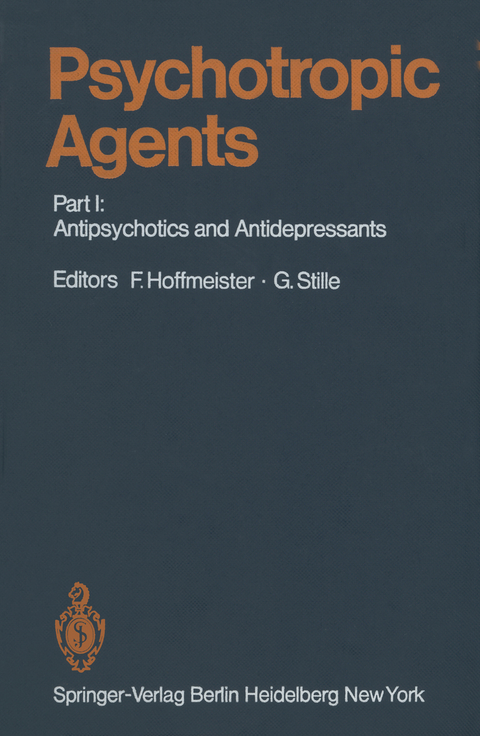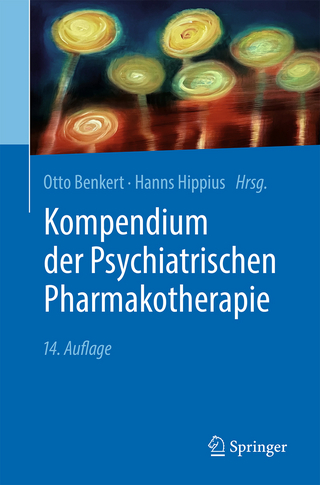
Psychotropic Agents
Springer Berlin (Verlag)
978-3-642-67540-9 (ISBN)
The volumes on "psychotropic substances" in the Handbook of Experimental Phar macology series clearly show that the classical concept of this discipline has become too narrow in recent years. For instance, what substances are psychotropic is determined not by the criteria of the animal trial, i.e. by experimental pharmacology, but by their action on the psy che, which in the final analysis is only accessible to us in man. Psychotropic substances force experimental pharmacology (and thus also this Handbook) outside its tradition allimits, which have essentially depended on animal studies. The antipsychotics and antidepressants were not discovered in animal ex periments, but by chance (or more precisely, by clinical empiricism). Experienced psy chiatrists trained in the observation of patients recognised the efficacy of drugs, the beneficial effect of which nobody had dreamed of before: DELAY and DENICKER in the case of chlorpormazine, KLINE in the case of the monoamine oxidase inhibitors and KUHN in the case of imipramine. It was only after these discoveries that the pharma cologists developed experimental models of the psychoses in animal experiments. However, even today we still do not know with certainty which of the effects shown in animals is relevant for the clinical effect despite the vast abundance of individual investigations. For many years, this uncertainty led to the testing of antipsychotics (e.g. of the neuroleptic type) in models which actually produced the undesired effects.
Antipsychotics: Chemistry (Structure and Effectiveness).- 1 Tricyclic Neuroleptics: Structure-Activity Relationships.- 2 Butyrophenones and Diphenylbutylpiperidines.- 3 Centrally Acting Rauwolfia Alkaloids.- 4 Behavioral Pharmacology of Antipsychotics.- 5 Testing Antipsychotic Drug Effects with Operant Behavioral Techniques.- 6 Stereotyped Behavior and Its Relevance for Testing Neuroleptics.- 7 Neurophysiologic Properties of Neuroleptic Agents in Animals.- 8 Antipsychotics: Neurophysiological Properties (in Man).- 9 Biochemical Effects of Neuroleptic Drugs.- 10 Biochemical Effects (in Men).- 11 Toxicology of Antipsychotic Agents.- 12 Clinical Pharmacology (Pharmacokinetics).- 13 Metabolism and Kinetics.- 14 Psychometric and Psychophysiological Actions of Antipsychotics in Men.- 15 Endocrine Effects of Neuroleptics.- Antidepressants: Chemistry (Structure and Effectiveness).- 16 Chemistry (Structure and Activity).- 17 Monoamine Oxidase Inhibitors as Antidepressants.- 18 Tricyclic Antidepressants: General Pharmacology.- 19 Neurophysiological Properties (in Animals).- 20 Clinical Neurophysiological Properties of Antidepressants.- 21a Biochemical Effects of Antidepressants in Animals.- 21b Biochemical Effects of Antidepressants in Man.- 21c Drug-Induced Alterations in Animal Behavior as a Tool for the Evaluation of Antidepressants: Correlation with Biochemical Effects.- 22 Toxicology of Antidepressant Drugs.- 23 Metabolism of Antidepressants.- 24 Physiological and Psychological Effects of Antidepressants in Man.- 25 Pharmacology and Toxicology of Lithium.- 26 Antipsychotics and Experimental Seizure Models.- Author Index.
| Erscheint lt. Verlag | 18.11.2011 |
|---|---|
| Reihe/Serie | Handbook of Experimental Pharmacology |
| Co-Autor | M. Ackenheil |
| Zusatzinfo | XXIV, 736 p. |
| Verlagsort | Berlin |
| Sprache | englisch |
| Maße | 170 x 244 mm |
| Gewicht | 1292 g |
| Themenwelt | Medizin / Pharmazie ► Medizinische Fachgebiete ► Pharmakologie / Pharmakotherapie |
| Medizin / Pharmazie ► Medizinische Fachgebiete ► Psychiatrie / Psychotherapie | |
| Medizin / Pharmazie ► Pharmazie ► PTA / PKA | |
| Schlagworte | Acetylcholin • Agents • Analgesics • Biotransformation • Butyrophenone • Chemistry • Diphenylbutylpiperidine • Insulin • Pharmacokinetics • pharmacology • Phenothiazine • Psychosis • Psychotrope Substanz • Rauwolfia • Serotonin • Thioxanthene • Toxicology |
| ISBN-10 | 3-642-67540-9 / 3642675409 |
| ISBN-13 | 978-3-642-67540-9 / 9783642675409 |
| Zustand | Neuware |
| Haben Sie eine Frage zum Produkt? |
aus dem Bereich


